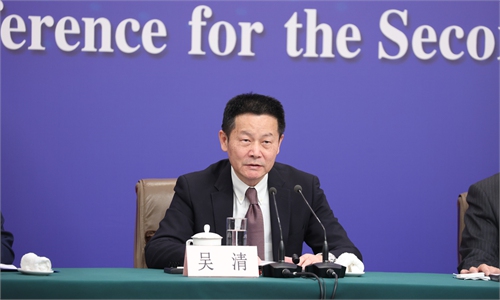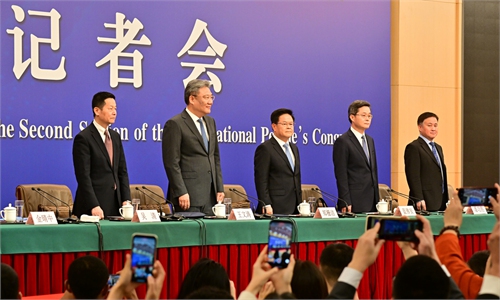

A view of the Lujiazui area in Shanghai Photo: VCG
Chinese Premier Li Qiang on Tuesday delivered the Government Work Report to the second session of the 14th National People's Congress (NPC). It set a number of key economic goals, including setting this year's GDP growth rate at around 5 percent while outlining a clear blueprint for China's economic work this year.I am impressed by the pragmatic signals sent out by the Government Work Report. It did not shy away from difficulties and pressures, and it discussed China's economic downward pressure in a very comprehensive, point-to-point way. Only by not avoiding those problems can we gain more accurate, targeted ways to solve them.
The market has high expectations on China's issuance of ultra-long special treasury bonds. The fiscal stimulus is in line with China's proactive fiscal and prudent monetary policy, and will positively impact China's financial market. It lifts up market expectation and confidence in the long run. With that policy consistence, it will help avoid big fluctuations in the market.
The Government Work Report for the first time stated that the underlying stability of China's capital market should be enhanced, which sends a strong signal on China's commitment to building itself into a financial powerhouse and set tone for the future development in related fields. The Chinese equities market had been on a turbulent ride at the beginning of 2024, so the Government Work Report gives investors a sense of encouragement as well as heightened reassurance.
There are a lot of works to do to improve the underlying stability of the capital market, and ensures its sound development. First and foremost is to continue to shore up the broad macro economy, which provides a foundation for capital market performance.
Targeted market reforms
Meanwhile, Chinese financial authorities need to further carry out targeted market reforms, such as creating more innovative oversight measures to shore up market trading vigor. Also, it is of vital importance to improve systematic design of the capital market, such as elevating the transparency of listed companies' information disclosure and carrying out a holistic supervision over all listed A-shares.
There's also the issue of investor education, especially for non-institutional investors. Many individual investors tend to focus more on short-term profits rather than long-term investments. So, how to strengthen investor education and cultivate qualified investors is crucial for the overall stability of the capital market.
Expanding the registration-based IPO system is indeed the future direction and a crucial aspect of deepening capital market reform. Last year, China published draft rules to broaden the registration-based IPO system, marking a big step toward reforming the world's second largest stock market. But it must be noted that advancement requires comprehensive evaluation work before proceeding with the implementation.
Immediately after China released its GDP target, along with a slew of other economic growth goals, a number of Western media outlets hyped that the country will miss the 5-percent GDP target in 2024, citing so-called insufficient stimulus while exaggerating other headwinds facing China.
Western prejudices
This reflects an ideological prejudice. What we aim for is a Chinese way of modernization, which involves promoting our unique path. However, in the eyes of some Western media pundits, they see China's pursuit of modernization in their stereotyped way or following their conventional thinking, so they are not very optimistic about China's growth prospects.
Because of certain Western politicians' ideological confrontation mind-set, they view themselves as the dominating global powers and feel insecure about China's rise. So they tend to evaluate Chinese economy from biased and pessimistic viewpoints.
Also, if we review the historical context, many economies have run into the so-called "middle-income trap" in the course of their development. The term refers to challenges faced by an economy when it reaches a certain stage, typically after becoming a middle-income country, where it struggles to continue to chalk up their economic development and break out of the middle-income bottleneck. Few of them have successfully overcome this trap and became developed nations over the past decades. And a number of Western scholars also think that China would be mired in that trap, and these concerns contribute to their pessimistic views on China's economic development.
But I don't see any signs at all of China falling into the "middle-income trap." Even if Chinese economy has slowed down in recent years, it remains one of the world's fastest growing major economies. Despite facing some external challenges, China's economy has demonstrated remarkable resilience. While external demand may be declining, we have developed new drivers of growth. While our traditional industries may experience significant fluctuations, new and effective growth points are emerging.
China has also set modest, pragmatic growth goals which I have full confidence will be met this year. From my perspective as a Chinese citizen and as an economist, the Government Work Report will act as a significant source of confidence. Chinese government is mindful of the problems the country currently faces. Once we confront these problems and identify them, we have the capability to solve them. This is precisely the important foundation for us to usher in a prosperous future.
The opinion is based on an interview with Fang Jie, a member of the National Committee of Chinese People's Political Consultative Conference and the president of Hubei University of Economics. She once served as the deputy secretary general of Wuhan city government in Central China's Hubei Province and the director of Wuhan Financial Work Bureau. bizopinion@globaltimes.com.cn



